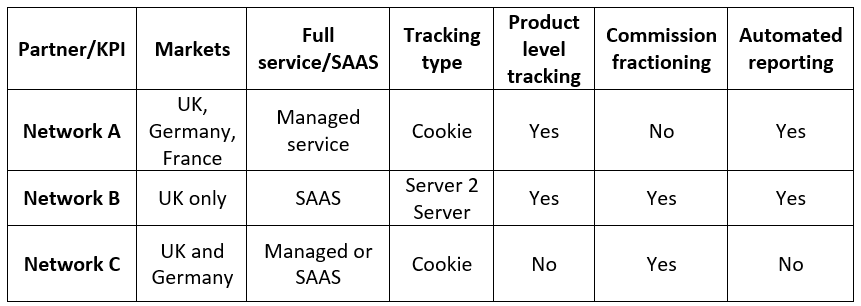Does this make your brain go fuzzy? Well, it’s no surprise. Trying to navigate the increasingly complex world of Marketing Technologies (MarTech) isn’t easy, and due to the fragmentation of media – predominantly caused by digital – the number of ‘MarTech specialists’ is on the rise.
Take the influencer industry, for example, a recent blog post on The Influencer Marketer highlighted the top 150 influencer marketing agencies, platforms and tools that you need to be aware of. Yes, you read that right, ONE HUNDRED AND FIFTY.
If you’re a brand that is looking to pick the right MarTech partner for your business, then you must be able to cut through the noise and truly understand if the potential partner’s USPs are as unique as they make them out to be.
In this article, I hope to give you some of the ways to differentiate hype from reality.
The Full Audit
Requirements: lots of resources, high technical capability and accurate comparable data sets
The most effective way to find out if a new MarTech vendor is being truthful is to fully audit their technology. In order to do this, you must be in the following position:
- Have an extensive understanding of the MarTech vendor’s industry
- Have the capability to test the MarTech vendor’s claims
If you don’t have any of these skillsets or capabilities internally, then you can always outsource.
As an example, let’s look at the geolocation data industry, something which has really gained steam over the past few years. All geolocation data companies claim their data is more accurate than their rivals, due to their hyper-local geo fencing beacon NFC (near field communication) proprietary AI platform… or something along those lines at least. But how can you get past the buzzwords to the truth?
In this example, you should look for an alternative accurate data set to compare the geolocation data partner against. For instance, if you’re a bricks and mortar store, this is a simple task and you can manually count the footfall to your store(s). If you don’t have a bricks and mortar store, then collaborate with someone who does, and use their data.
Compare the footfall data set against the geolocation partner’s data set, over a defined period, and see if the peaks are troughs are synchronised. Do this across a wide range of geolocation partners at the same time, to get a definitive view on ‘best in market’.
The Matrix
Requirements: some understanding of the industry, limited resource required
Quite simply, create a table with your partners on one axis and the core competencies on another axis. For instance, if we were to look at three completely fictitious affiliate networks with some basic core competencies then it might look something like this:
Similarly, for a lead generation platform:
It seems obvious, but many companies just don’t do it. This gives you a clear illustration of the different partners that are out there, vs their ability to deliver what you need.
Dave Chaffey from Smart Insights has a nice little piece on how to do this effectively here.
The Sherlock Holmes
Requirements: some understanding of the industry, limited resource required
Sometimes an old-fashioned Q&A is enough to deduce the capability of approaching MarTech partners. Aside from affiliate marketing, I also work in a business unit within MediaCom called BLINK, an innovation consultancy, which looks to navigate the world of start-ups and new MarTech partners on behalf of our brands. Sometimes there are start-ups emerging in areas which don’t even exist yet, so it’s hard to compare them using the previous two methods. For start-ups, our questions might be more around their business operations – revenue, clients, client retention/churn, case studies, size of the team, whether developers are in-house or outsourced, etc. Building out a questionnaire for your partners is a quick and simple way to get the information that you want.
If you’re not sure what questions to ask, then research online. For instance, Artificial Intelligence (AI) is an ever increasing area, with more companies claiming that AI is part of their make-up – knowing that a) it sounds fancy to clients and b) it’s difficult to disprove. However, with a bit of handy Googling, you can find simple ways to put these companies on the spot.
Follow guidelines and best practices which have been drawn up by others, and see how they work for your business.
Summary
If you can incorporate some of the above audit processes into the way you evaluate you MarTech partners, then you’re onto a winner. Ensure you are utilising rational thinking in your decision-making process, and not purely picking your partners based on emotions.
The main piece of advice I can give is to audit your tech companies based on your terms, i.e. what is important to YOU, and the rest will fall into place.



